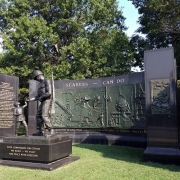The revised A Level H2 History syllabus (9174)
H2 History (9174)
The Scheme of Assessment remains the same, featuring two papers, with a duration of three hours each. For each paper, candidates have to complete a compulsory source based case study (SBCS) and two essay questions.
Paper 1: The Changing International Order (1945-2000)
- Section A: Source Based Case Study – Theme I
- Section B: Essays – Themes II and III
Paper 1 Theme I: The Development of the Cold War (1945-1991)
This SBCS theme covers a heavily-studied topic, the Cold War. Candidates will explore the origins of the Cold War in the post-WWII phase, followed by the Globalisation of the Cold War and finally the End of the Cold War. It is imperative to draw references to recurring concepts, such as ideological rivalry between the superpowers that defined their motivations in proxy conflicts.
- Emergence of the Cold War after the Second World War
- Manifestations of the Global Cold War (Korean War, Vietnam War, Cuban Missile Crisis)
- End of the Cold War
Note: Pretty much the same as before. There’s no drastic change to the syllabus content for this theme.
Paper 1 Theme II: The Development of the Global Economy (1945-2000)
For this essay theme, candidates have to select one out of two given questions in the examination to answer. This theme focuses on the economic perspective of the world in the 20th century. For instance, there will be coverage of the reasons for the ‘Golden Age of Capitalism’ between 1945 and 1971, followed by the causes and consequences of the Crisis Decades (such as the twin oil shocks of the 1970s). Another sub-section of this theme features country case study assessment of two East Asian economies, namely Japan and China.
- Growth and Challenges in the Global Economy
- Transformation of East Asian Economies (Japan and China)
Note: The ‘Growth and Challenges in the Global Economy’ remains unchanged if we compare it with the old syllabus (phased out by 2024). As for ‘Transformation of East Asian Economies (Japan and China)’, this sub-section will replace the ‘Rise of Asian Tiger economies’ that featured South Korea and Taiwan.
Paper 1 Theme III: Conflict and Cooperation (1945-2000)
For this essay theme, candidates are required to select one of the two given questions in the examination to answer. This theme examines the reasons for conflicts in the 20th century and also efforts to forge international cooperation. This theme unpacks the nature of conflicts in two parts: Inter-state conflicts and Intra-state conflicts. For inter-state conflicts, candidates will learn more about the Indo-Pakistani Conflict and Arab-Israeli Conflict. For intra-state conflicts, candidates will study the Congo Crisis and Bosnian War.
- Causes, Development and Management of Inter-state Conflicts
- Causes, Development and Management of Intra-state Conflicts
Note: This theme undergoes an extensive overhaul in which the past Theme III featured the ‘United Nations’ from an organisational approach, covering specific principal organs and their functions, as well as peacekeeping in a macro-perspective. It appears that the number of case studies has been reduced to four to provide a more in-depth coverage of the subject matter.
Paper 2: Developments in Southeast Asia (Independence-2000)
- Section A: Source Based Case Study – Theme III
- Section B: Essays – Themes I and II
Paper 2 Theme I: Forming Nation-States
For this essay theme, candidates have to select one out of the two questions in the examination to answer. Candidates will learn more about two pillars of nation-building: efforts to achieve political stability and create national unity. Candidates are required to relate featured concepts to a variety of country case studies, as explicitly stated by the SEAB [Brunei, Cambodia, Indonesia, Laos, Malaysia, Myanmar (Burma), Singapore, Thailand, the Philippines and Vietnam].
Note: Content in this theme largely remains unchanged if compared with the phased out syllabus (by 2024). It is imperative to keep in mind how the Cold War developments (see Paper 1 Theme I) could impact Southeast Asia for a more in-depth analysis.
Paper 2 Theme II: Economic Change After Independence
For this essay theme, candidates have to choose one out of two essay questions in the examination to answer. They will learn more about the government efforts to pursue at least one of the three major aims: economic growth, equity and nationalism. Also, there will be a coverage of strategies employed to facilitate growth of specific sectors, such as agriculture, industry and finance and services. In addition, candidates are required to examine the outcomes of economic challenge, particularly to find out if the government efforts led to more beneficial or detrimental impacts on Southeast Asian economies.
- Economic Change in Southeast Asia
- Outcomes of Economic Change
Note: A key change to this Theme II is the omission of the ‘Asian Financial Crisis’ sub-topic that was featured in the phased out syllabus.
Paper 2 Theme III: Regional Conflicts and Cooperation
For this SBCS theme, candidates must attempt two parts of the compulsory question – parts (a) and (b) during the examination. The six sources (A-F) will be based on topic(s) taken from this theme. Theme III covers the causes and consequences of inter-state tensions, narrowing down to five case studies that impacted bilateral and regional relations in Southeast Asia. Furthermore, candidates are to study the regional association ASEAN and how it was formed to promote regional cooperation.
Note: A noteworthy update to this Theme III is the specification of case studies featured in the ‘Inter-state Tensions and Cooperation’ sub-topic. Previously, the possible case studies tested were more than what’s stated, such as the Sipadan-Ligitan dispute, Pedra-Branca dispute and Chaim Herzog controversy. It appears that the ‘ASEAN’ section still features similar content from the phased out syllabus.
For more information on the H2 History (9174) syllabus, please refer to the SEAB document.
If you are in search of a suitable JC History Tuition program, you are in the right place! Our classes are organised and conducted in ways to ensure that you have the content knowledge and answering skills to handle the rigours of the GCE A Level History examination.
You will receive study notes, participate in thought-provoking class discussions and attempt writing practices with tutor guidance to review your application skills. You can also follow our Telegram Channel to get useful updates.
We have other JC tuition classes, such as JC Math Tuition and JC Chemistry Tuition. For Secondary Tuition, we provide Secondary English Tuition, Secondary Math tuition, Secondary Chemistry Tuition, Social Studies Tuition, Geography, History Tuition and Secondary Economics Tuition. For Primary Tuition, we have Primary English, Math and Science Tuition. Call 9658 5789 to find out more.











